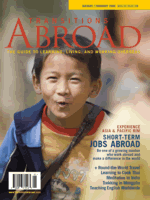|
From The Editor
It looks to be a good new year for life-enriching travel, with voluntourism and responsible travel on the rise, study abroad’s continued record growth (it’s up another 9.6 percent from 2004, according to the Institute for International Education), and more North Americans working and living abroad. (Web Editor's Note: See a map on the site of the current American expatriates provided by the Association of American Residents Living Overseas).
But while thoughtful, learning-based travel and community-based tourism are increasing, so too is the darker side of travel: the prostitution of women and children in tourism. The nonprofit organization End Child Prostitution, Child Pornography, and the Trafficking of Children estimates that more than one million children worldwide are drawn into the sex trade each year. The response to the epidemic, particularly in countries with unstable governments, has been largely ineffective.
A number of international organizations, however, are working to eliminate commercial sexual exploitation of women and children. (See a list of these organizations in the Transitions Abroad Nov/Dec 2005 issue.) In this issue we include a profile of Cambodian Somaly Mam (page 18), a former child prostitute who risked her life to found an international NGO that provides shelter, education, and professional training to prostituted children and young women. This feature on Somaly represents Transitions Abroad’s continuing focus on activist responsible travel.
New this time is a section called “Postings” (page 13). With the internet boom and the glut of travel information online, we’ll try to help you uncover the most interesting and useful resources and content available. In each issue, we’ll highlight travelers’ firsthand recommendations, alternative travel news, and travel providers’ latest and best offerings.
At the same time, our Webmaster will help you identify the most worthwhile blogs. He says, “In each issue we will look at blogs of interest as this medium matures into a mode that combines inspiring narratives and journalistic snapshots in the able hands of travel writers or travelers with an eye and a message.”
This issue’s featured blogger is Joshua Berman. His choice of destinations on his round-the-world itinerary, which includes Cambodia and Thailand, is timely: these are two of the six Mekong River countries (the others are Laos, Myanmar, Vietnam, and Yunnan Province of China) that are part of a recently developed long-term tourism strategy to promote the Mekong as a single destination (see www.visit-mekong.com/welcome/message_escap.htm and www.unescap.org/jecf/p08tourism.htm). The plan is to help distribute the benefits of tourism more widely and contribute to poverty reduction, gender equality and empowerment of women, and sustainable development while minimizing adverse impacts.
With the rapid development of many Asian countries, the timing is no surprise. For those considering short-term work such as teaching English, the market is booming in China and in regional capitals in Taiwan, Thailand, and South Korea. To learn more about short-term work opportunities to fund your travels or as a stepping-stone to international careers, turn to Susan Griffith’s Best Short-Term Jobs Resources (page 46).
Those researching an international career move will want to read our new columnist Jean-Marc Hachey’s “International Career Adviser” (page 84). Hachey’s The BIG Guide to Living and Working Overseas, now in its 4th edition, is one of the most important sources for North Americans seeking international work and training. In each issue, Hachey will provide expert advice on career planning, job searching, and choosing specific professions abroad.
In the next issue, which focuses on study abroad (and in which we announce the student writing contest winner), Hachey will address the topic of job strategies while studying abroad.
—Sherry Schwarz
As we focus our attention on Asia, please keep in mind the earthquake survivors in Pakistan’s relief camps. Winter conditions, poor hygiene, hunger, and the possible outbreak of disease threaten their lives. According to UNICEF, $5 can provide an emergency health kit for one person for three months, with medical supplies and drugs to cover basic needs.
|


